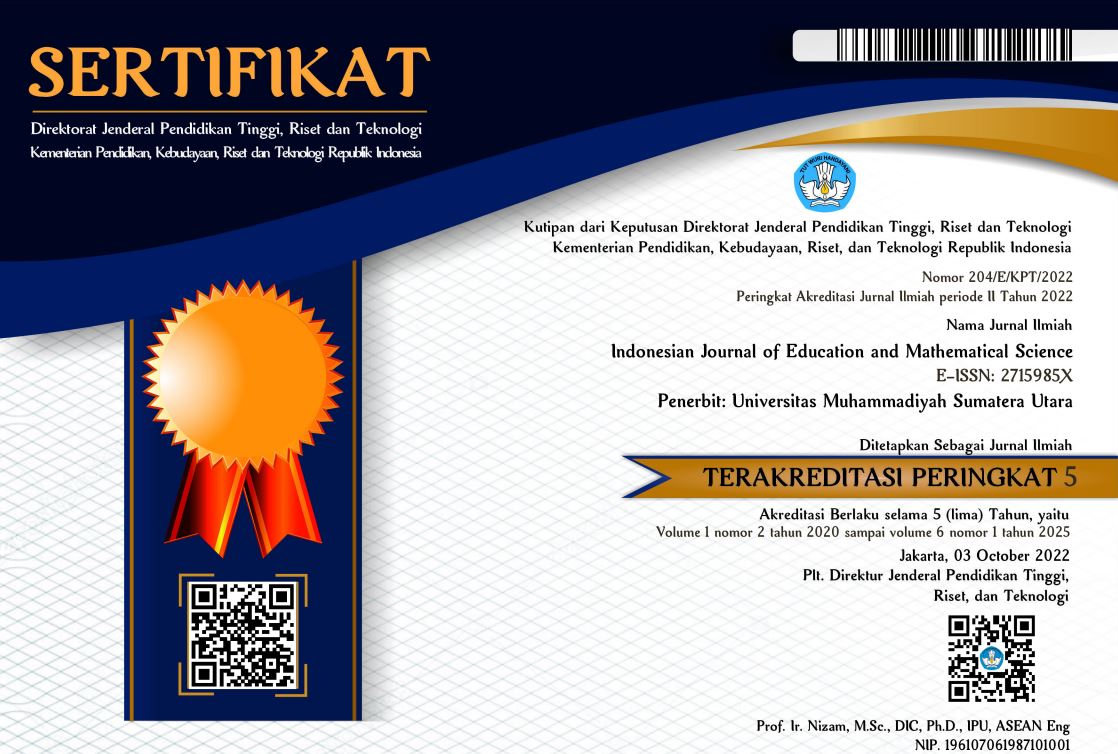The Development of Student's Worksheet based on Scientific Approach on Matrix Material in High School
Abstract
The formulation of the problem from this research was "Is the development of LKPD based on a scientific approach on matrix material in high school feasible to use? How do students respond to LKPD based on a scientific approach to matrix material?" The purpose of this study is to find out whether the development of LKPD based on a scientific approach to matrix material in high school is feasible to use. This research was a research and development that used a 4D development model which consists of 4 stages, such as the definition stage, the design stage, the development stage, and the dissemination stage. However, in this study, the researchers only limited it to the 3D stage, which was defining, designing and developing. The instrument in this study was a questionnaire sheet for the expert feasibility test. Based on the validation results from the validator, the student's worksheet assessment scores were obtained by two expert lecturers and one mathematics teacher with an average percentage value of 79% and categorized as "Eligible". For student responses to LKPD based on a scientific approach to the matrix material, the average percentage value is 86% and is categorized as "Very Good". It can be concluded that the LKPD based on a scientific approach to the matrix material developed by the researcher is feasible to be used as additional teaching material for students.
Keywords
Full Text:
PDFReferences
Anggoro, B. S. (2015). Pengembangan Modul Matematika Dengan Strategi Problem Solvin Guntuk Mengukur Tingkat Kemampuan Berpikir Kreatif Matematis Siswa. Al-Jabar : Jurnal Pendidikan Matematika, 6(2), 121130. https://doi.org/10.24042/ajpm.v6i2.25
Awaluddin, R. F. D., & Wanarti, P. (2016). PLC Untuk SMK Raden Patah Kota Mojokerto Rafiqul Fahmi Dian Awaluddin. Jurnal Pendidikan Teknik Elektro, 05(03), 711716.
Batubara, I. H., Nasution, M. D., & Wahyuni, S. (2020, October). Improving Mathematical Reasoning Ability Through Guided Discovery Methods Assisted By Autograph Software. In Proceeding on International Conference of Science Management Art Research Technology (Vol. 1, No. 1, pp. 71-77).
Doly, N. M. (2021, February). Students perception on learning mathematic during the time of covid 19. In Journal of Physics: Conference Series (Vol. 1778, No. 1, p. 012036). IOP Publishing.
Fausih, M., & Danang, T. (2015). Pengembangan Media E-Modul Mata Pelajaran Produktif Pokok Bahasan Instalasi Jaringan Lan (Local Area Network) Untuk Siswa Kelas Xi Jurusan Teknik Komputer Jaringan Di Smk Nengeri 1 Labang Bangkalan Madura. Jurnal UNESA, 01(01), 19. https://jurnalmahasiswa.unesa.ac.id/index.php/jmtp/article/view/10375
Habibi, B. (2017). Pengembangan Media Pembelajaran Interaktif Multimedia Menggunakan Kvisoft Flipbook Maker Berbasis Etnomatematika. In Jurnal Pendidikan Matematika: Vol. Vol. 1.
Harahap, T. H., & Nasution, M. D. (2021). Upaya Meningkatkan Pemahaman Konsep Matematika Menggunakan Model Pembelajaran Connected Methematics Project (Cmp). Journal Mathematics Education Sigma [JMES], 2(1), 8-12.
Harahap, T. H., & Nasution, M. D. (2015). Penerapan Contextual Teaching And Learning (CTL) Untuk Meningkatkan Kemampuan Koneksi dan Refresentasi Matematika Siswa. EduTech: Jurnal Ilmu Pendidikan dan Ilmu Sosial, 1(01).
Penerapan Model Pembelajaran Ropes (Review, Overview, Presentation, Exercise, Summary) Untuk Meningkatkan Hasil Belajar Matematika Pada Siswa MTS Hifzhil Quran Medan. Education Journal of Indonesia, 1(1).
Nasution, M. D., & Nasution, E. (2018). PENGEMBANGAN BAHAN AJAR MATA KULIAH METODE NUMERIK DENGAN PENDEKATAN METAKOGNITIF BERBANTUAN MATLAB. Kumpulan Penelitian dan Pengabdian Dosen, 1(1).
Nasution, M. D., Nasution, E., & Haryati, F. (2017). Pengembangan Bahan Ajar Metode Numerik dengan Pendekatan Metakognitif Berbantuan MATLAB. Mosharafa: Jurnal Pendidikan Matematika, 6(1), 69-80.
Nasution, M. D. (2021). Beliefs of mathematics teachers on motivation and action learning models in classroom learning process: indonesian perspective. Educational Sciences: Theory & Practice, 21(1), 155-166.
Nasution, M. D. (2008). Pengembangan Metode Data Envelopment Analysis Untuk Menentukan Efisiensi.
Nasution, M. D., Ahmad, A., & Mohamed, Z. (2021). PRE SERVICE TEACHERSPERCEPTION ON THE IMPLEMENTATION OF PROJECT BASED LEARNING IN MATHEMATIC CLASS. Infinity Journal, 10(1), 109-120.
Nasution, M. D., & Oktaviani, W. (2020). Pengembangan perangkat pembelajaran matematika berbasis masalah untuk meningkatkan kemampuan pemecahan masalah siswa SMP Pab 9 Klambir V TP 2019/2020. Journal Mathematics Education Sigma [JMES], 1(2), 46-54.
Nasution, M. D., & Sari, E. T. (2019). The Influence of Cycle Learning Model on Mathematics Learning Motivation in Private Vocational School Students Harapan Mekar Medan Marelan TP 2017/2018. IJEMS: Indonesian Journal of Education and Mathematical Science, 1(1), 44-57.
Nasution, M. D. (2017, October). Approaches to School Supervision in Indonesian Context. In 4th Asia Pacific Education Conference (AECON 2017) (pp. 6-9). Atlantis Press.
Nasution, M. D., Mawengkang, H., Kamil, A. A., Efendi, S., & Sutarman. (2020). Sample median approximation on stochastic data envelopment analysis. International Journal of Agile Systems and Management, 13(3), 279-295.
Nasution, M. D. (2020). Pendekatan Sampel Median (Sample Median Approximation) pada Stochastic Data Envelopment Analysis (SDEA).
Nasution, M. D., Batubara, I. H., Siregar, Z., & Rimbawati, R. (2021). Pemberdayaan Kelompok Pembatik Sebagai Upaya Pengembangan Kearifan Lokal Di Desa Perjaga Pakpak Bharat. ABDI SABHA (Jurnal Pengabdian kepada Masyarakat), 2(2), 213-219.
Nasution, M. D., & Prastika, C. (2020). Upaya Meningkatkan Hasil Belajar Siswa Melalui Model Pembelajaran Kooperatif Make-A Match (Mam) Pada Materi Limit Fungsi Di Kelas XI MAN 1 Medan. Jurnal Penelitian, Pendidikan dan Pengajaran: JPPP, 1(1), 8-15.
DOI: https://doi.org/10.30596/ijems.v3i3.11092
Refbacks
- There are currently no refbacks.
Indonesian Journal of Education and Mathematics Science
Universitas Muhammadiyah Sumatera Utara
Kampus Utama
Jl. Kapten Muchtar Basri No.3, Glugur Darat II,Medan
Sumatera Utara-20238
E-mail: ijems@umsu.ac.id
This work is licensed under a Creative Commons Attribution-ShareAlike 4.0 International License.






